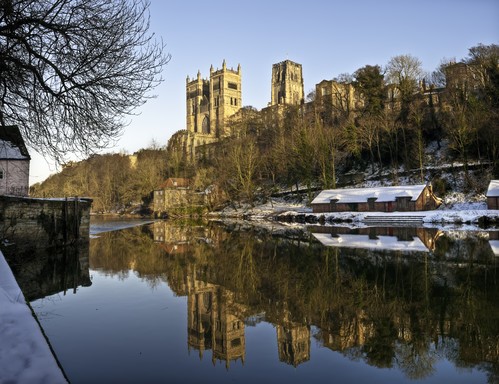The IAS welcomes its Epiphany Term Fellows

The Institute's second cohort of visiting Fellows has begun to arrive in Durham. This term we welcome a number of Fellows to the Institute and wider University, as well as our virtual Fellows.
The IAS Fellowship continues to play a vital and integral role in the life of the IAS, and we encourage engagement with our Fellows.
This term Fellows’ lectures and seminars are scheduled both in person and online, and collaborators will develop programmes of work during the term (see IAS events for further information).
Our IAS Fellows are:
Dr Stefano Bertea, Associate Professor at the School of Law of the University of Leicester.
Dr Daniel Blinkhorn (virtual Fellow), a composer, sound and digital media artist from the University of Sydney.
Professor Abby Kinchy, Professor of Sociology from the department of Science and Technology Studies at Rensselaer Polytechnic Institute in Troy, New York, USA.
Dr Marit Kragt (virtual Fellow), Economist from the University of Western Australia School of Agriculture and Environment.
Professor Britt Kramvig, Professor in the Department of Tourism and Northern Studies at UiT the Arctic University of Norway.
Artist, Ms Jana Winderen.
Professor Susanne Winterling, artist and Professor of fine art at the Trondheim Academy of Fine Art (Norwegian University of Science and Technology.
Full details of the Fellows are located at www.durham.ac.uk/research/institutes-and-centres/advanced-study/about-us/people/202122-fellows/.
Three major interdisciplinary projects also take place during term:
- Firing up the Epistemological Engine explores one component of the Durham Epistemological Engine (DEE) by developing methods to automate the processes involved in a literature review, in particular to support meta-analysis by using computer science (CS) tools such as natural language processing, deep learning, and AI.
- Exploring Artic Soundscapes focuses on ways in which northern peoples and outsiders perceive the Arctic and its sounds. The project will develop new practices for fusing scientific and artistic invocation and explanation of Arctic environments.
- Enabling Responsible Space Exploration brings together stakeholders to discuss the implications of ‘democratising Responsible Space Exploitation space’ and to identify the opportunities, challenges and barriers to creating an environmentally, economically and socially sustainable space industry.
Further information about these projects, including details of the project investigators and contact details, can be located at www.durham.ac.uk/research/institutes-and-centres/advanced-study/projects/current-projects/.


/prod01/prodbucket01/media/durham-university/research-/research-institutes/institute-of-advanced-study/43486-hero.jpg)